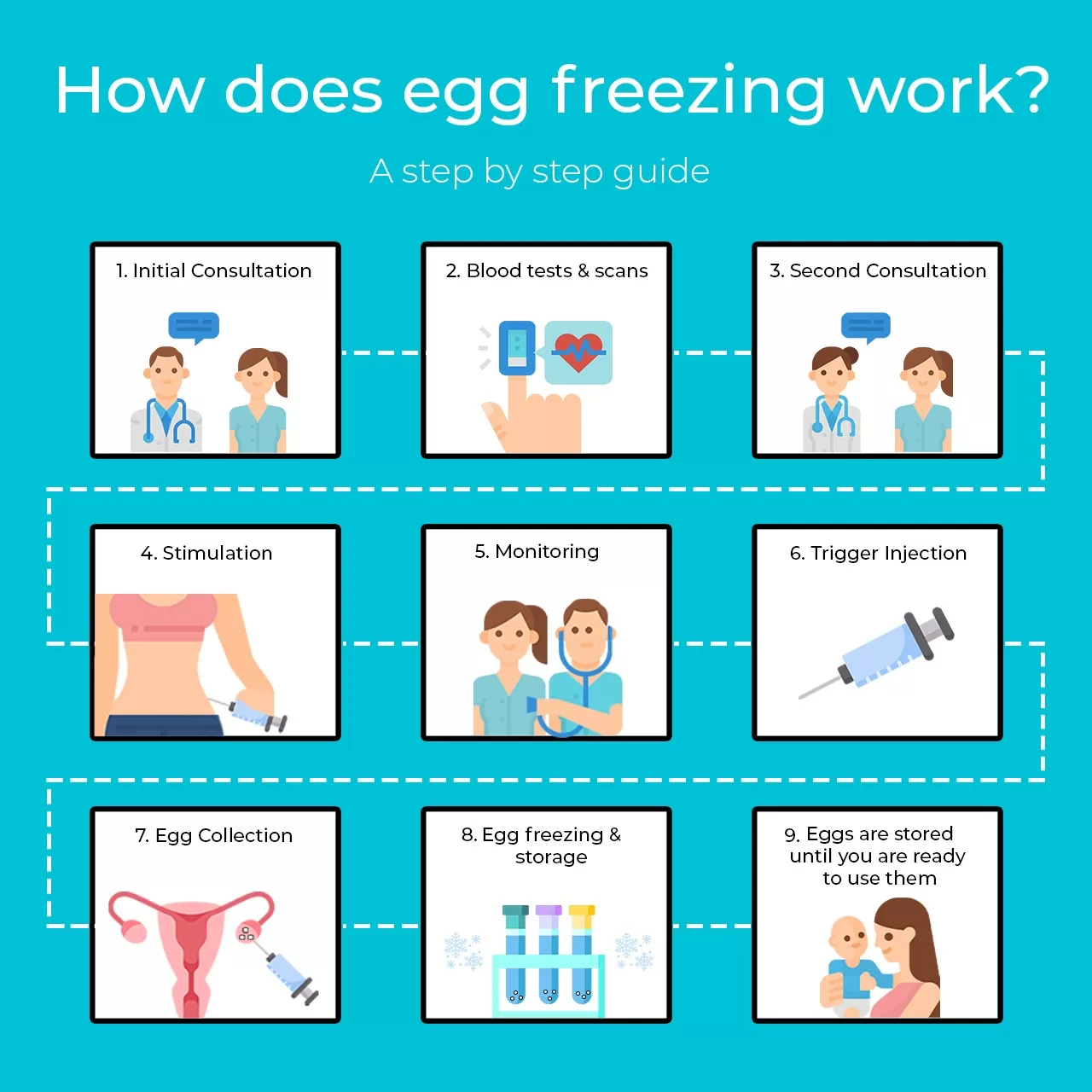Treatments & Services
Egg Freezing
We can store your eggs, so they are ready when you are.
There are many reasons you might delay the decision to have a baby such as waiting until you are in the right relationship or a better time in your career, or you may not even be sure you want to have children but want to have the option should you change your mind in the future. Unfortunately, as we age the quantity and quality of our eggs diminish, and our biological clock may not fit in with our life plans. Elective egg freezing can give you more options for when to start a family.
Collecting and freezing eggs at an optimum time helps to increase your chances of a successful pregnancy in the future.
Elective egg freezing is a method of fertility preservation where unfertilised eggs are stored following ovarian stimulation and egg collection. When you are ready to use your eggs, they are thawed and fertilised with sperm to create embryos. It’s important to note that freezing and storing your eggs is not a guarantee that you’ll have a baby when you decide to in the future. However, it does provide you with more options if you do wish to have a child later on.
When is the best time to freeze my eggs?
The earlier you freeze your eggs, the better your chance of achieving a successful pregnancy – regardless of when you decide to use them. While your ovaries continue to age and the number of viable eggs declines, your body is capable of supporting a pregnancy until menopause.
Your chance of a pregnancy and a healthy baby is closely linked with the age at which you decide to undergo egg freezing. The optimum time to freeze your eggs is when you have the best ovarian reserve, typically from the early 20s to early 30s. Egg freezing after 35 is still an option; however, you may require multiple rounds of treatment to improve your chances of success, and the quality of your eggs will be lower.
Your fertility doctor will make recommendations as to the number of eggs you should consider storing depending on your age and the plans you have for your family, for example, are you aiming for one child, or are you considering having siblings for them at a later date?

What egg freezing involves:
Egg freezing is a very common and safe procedure and you’ll be guided through it by our fertility doctors and nurses.
There are five main steps:
- Initial consultation and tests
- An appointment to review results
- Egg stimulation
- Egg collection
- Vitrification (freezing) and storage
Initial Consultation and Tests
Your first consultation will be with one of our fertility doctors who will take a medical history and arrange the following tests:
- AMH blood test to determine your ovarian reserve (how many eggs you have)
- Blood tests to check overall health
- Baseline pelvic scan and antral follicle count- this is a trans-vaginal ultrasound of the ovaries and fallopian tubes which when combined with the data from your AMH test, can give your fertility doctor a better picture of how you may respond to medications and whether egg freezing is right for you.
After your appointment, you'll meet with one of our fertility nurses to discuss the egg freezing process and they will answer any questions you have. They'll also check your weight, height, and blood pressure and give you information about optimising your egg quality through diet, plus anything to avoid.
Review Appointment
At your follow-up appointment, your doctor will explain your test results and the number of treatment cycles you are likely to need based on your individual situation. If you decide to proceed, they'll provide you with consent forms and prescriptions for your medication. We’ll need these consent forms returned before you commence treatment.
You will also see a nurse who will provide detailed instructions for medications including how to do self-injections – and it’s not as bad as you think! They will give you information sheets on the medications and discuss how to book on to start treatment.
There is quite a lot of information to digest at this appointment so you are welcome to bring a friend or other support person so they can take notes for you or ask questions. We will of course give you lots of material to take away to explain the procedure, and you can call on our nurses afterwards if you have any other questions.
Egg Stimulation, Monitoring, and Trigger Injection
During stimulation, we work with your natural cycle. In a 'normal' menstrual cycle one egg usually matures each month, but during an egg freezing cycle, you'll take hormone-stimulating medications to encourage more eggs to mature. Most people feel a bit bloated for the 10-14 days of the cycle but there shouldn’t be any pain or major discomfort.
During this time you'll have some appointments here at the clinic for blood tests and scans to check how your eggs are maturing. These are scheduled early in the morning so you can attend before work or other commitments.
Once you are ready for your eggs to be collected we will advise you when to take your trigger injection. This injection helps with the final maturation of the eggs before collection by your doctor.
Egg Collection
Egg collection is performed at Glenelg Day Surgery which is in the same building as our clinic. An anaesthetist will give you a light anaesthetic and your doctor will use ultrasound to guide a very fine needle through your vaginal wall into the ovary to collect the mature eggs.
You’ll be able to go home after about an hour and you'll need to arrange for someone to collect you. For your safety, the day surgery won't allow this to be an Uber or taxi (or public transport) so please plan for a friend or family member to drive you home. We recommend that you rest for the remainder of the day, and find most people are fine to go to work the following day. If you need a medical certificate, just let us know.
Vitrification (freezing) and Storage
On the day of collection, your eggs will be assessed for maturity. Mature eggs are snap-frozen in our lab using a process called vitrification. Your eggs are securely stored in specialised tanks under liquid nitrogen, which ensures they remain at a consistently cold temperature. Our storage tanks undergo 24-hour electronic temperature monitoring and are located in a secure and alarmed area only accessible by our embryology team. This process is highly successful, with around 80-90% or more of the eggs surviving the thaw.

Using Your Eggs
If you decide to use your frozen eggs to try to get pregnant they will be thawed ready to be fertilised. To fertilise your eggs we use a process called intracytoplasmic sperm injection (ICSI), a technique for in vitro fertilization in which an individual sperm cell is introduced into an egg cell. You should be aware that this is an additional cost to egg freezing so you should factor this into your decision about whether to freeze your eggs. Your doctor will give you more information about this when you have your first appointment.
Flinders Fertility's fee for a non-medicare (elective) egg-freezing cycle is $5,000 which includes 6 months of storage. After that storage is billed at $300 every 6 months.
In addition to the cycle fee, you'll need hormone medications to stimulate your ovaries during an egg-freezing cycle. As the medication is tailored to your specific needs the costs can vary, but as a guide, it is usually in the region of $1,500 -$2,000.
Fees for the day surgery and your anaesthetist are billed separately and we suggest that you check with your health fund before your egg collection to see if you are covered and if any excess applies.
A surprising number of women that we see do have a condition that was previously undiagnosed (such as endometriosis or PCOS) so they find they are eligible for Medicare rebates to freeze their eggs. In this case, the out-of-pocket fees, medications, and surgical costs for egg freezing are much less, and most importantly, they’ve found this out before they want to start a family so can take some control over their future.
Whatever your personal circumstances, we offer flexible payment plans with Handypay and our friendly finance team will be able to advise you in more detail about the costs of egg freezing.

As this is an elective procedure, unfortunately, there is no Medicare rebate unless you are found to have an issue that may cause infertility in the future such as PCOS. If this is the case, we’ll arrange for a fertility specialist to advise whether egg freezing is still appropriate or whether you may require other medical treatment.
Eggs can generally be kept in storage for up to 15 years (this time can be extended in special circumstances), provided you continue to pay the annual storage fee. During this time, we send out an annual storage letter to ensure we continue to honour your wishes and inform you as to when the storage time limit is approaching.
If you decide you no longer need or want to continue to store your eggs, please contact us and we’ll sort out the paperwork with you. We often get asked if eggs can be donated to either someone known to you or anonymously. Egg donation is a gift to those in need and can be considered in some cases; however, you would need to go through further medical tests and genetic screening to check suitability. Counselling is also required in order to explore the complexities and ethical dilemmas that donation can involve.
Want to find out more?
To see if egg freezing is suitable for you, book an appointment with one of our doctors.
Book Egg Freezing Consultation